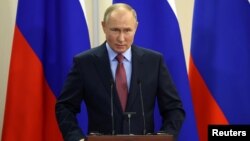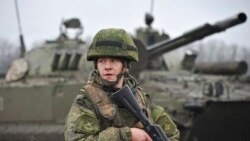Russia should not expect the United States and its allies to go along with its recent demand for an expansive set of "security guarantees," including a ban on the further expansion of NATO and a cessation of all military activity by the alliance in Eastern Europe, the Caucasus and Central Asia, experts and U.S. officials said Friday.
The United States and its NATO allies, however, signaled that they might be willing to enter talks with Russia, especially if the Kremlin agrees to draw down troop levels along its border with Ukraine that have raised concerns about a possible invasion.
The U.S. and NATO were reacting to a pair of draft treaties that the Russian Foreign Ministry presented to them earlier this week and then released publicly on Friday. The drafts, which were prepared without consulting the U.S. and NATO, would commit the alliance to not deploy additional troops to countries that did not already have NATO forces present in 1997.
That would include Eastern European alliance members such as Poland, Hungary, the Czech Republic, the Baltic states and several other former Soviet republics.
The proposed treaty would also commit both sides to limits on short- and intermediate-range missile deployments and on large-scale military exercises near the Russian border.
Few concessions from Russia
U.S. and NATO officials noted that the drafts contain no major concessions from Russia on alliance concerns, such as troop levels near Ukraine and other aggressive actions by the Kremlin.
"We are clear that any dialogue with Russia would have to proceed on the basis of reciprocity, address NATO's concerns about Russia's actions, be based on the core principles and foundational documents of European security, and take place in consultation with NATO's European Partners," NATO said in a statement. "Should Russia take concrete steps to reduce tensions, we are prepared to work on strengthening confidence-building measures."
In a background press briefing Friday, a State Department official used similar language to indicate that the U.S. was willing to talk to Russia but added that the Biden administration would not negotiate with Russia over security in Europe without its European partners present.
US response pending
The Biden administration is preparing a response to Russia's demands that it intends to deliver next week, U.S. officials said.
"Russia has now put on the table its concerns with American and NATO activities," White House national security adviser Jake Sullivan said in remarks delivered Friday at an event sponsored by the Council on Foreign Relations.
"We're going to put on the table our concern with Russian activities that we believe harm our interests and values," Sullivan said. "That's the basis of reciprocity, upon which you would pursue any kind of dialogue. We can make progress in some areas, and in other areas, we're just going to have to disagree."
Experts concerned
The unconventional nature of Russia's gambit left some experts worried about what the Kremlin expected to achieve by it. Russian officials presented the draft treaties to the United States and NATO on Wednesday and then suddenly made the documents public on Friday, before the supposed counterparties to the agreements had enough time to respond.
"Doing this within two days of presenting the first draft to American diplomats is really unheard of," Andrew Lohsen, a fellow in the Europe, Russia and Eurasia Program at the Center for Strategic and International Studies, told VOA. "The speed at which they're moving to publicly release these documents suggests that they understand that these negotiations are not going to proceed very far."
Jeffrey Edmonds, a senior analyst at the security think tank CNA, told VOA that Russia could be setting up the negotiations for failure to create a pretext for an invasion of Ukraine.
"For a country that is well-versed in negotiations and treaties … the notion of sending us a draft treaty is somewhat absurd, and I'm sure the Russians understand that," he said.
"Then what's the point?" Edmonds said. "The point is that it lays a very thin veneer of legitimacy over the very high probability that they're going to go into Ukraine in the next couple of months."
'This is what Russia cares about most'
Michael O'Hanlon, a senior fellow and director of foreign policy research at the Brookings Institution, cautioned against the assumption that the demands Russia put forward in the two draft treaties are either a maximalist bargaining position meant to be bargained down or a proposal designed to fail.
"I think they are the actual, sincere Russian desires," he told VOA. "I don't think that they're a ruse. This is what Russia cares about most: having NATO in its backyard."
O'Hanlon, who has argued that it would be a mistake for NATO to allow more former Soviet states into the alliance, said he believes it makes sense for NATO to engage with Russia.
However, he said, it should do so with its eyes open. "It's always possible that if we said yes to all of this, that (Russian President Vladimir) Putin would have his appetite whetted for even more concessions."












